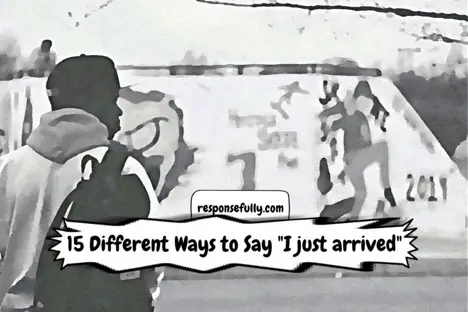How do you announce your arrival? There are several ways to say you have arrived at a place. One of the simplest ways is direct: ‘I just arrived’.
There are many reasons you may want to make it known that you have just gotten to a place. For example, important information may have been passed in your absence.
You may be expected to do or know certain things. In this case, it is important to state that you have been absent.
There are also many different ways to say you just arrived. In some cases, you only have to imply it by saying totally different words.
When you say something like ‘What has been going on in my absence?’, the listener immediately understands that you have been absent and you may not get some information that has been passed.
Below are 15 different ways to say ‘I just arrived’
- I just got here.
- I’m new.
- I’m just landing.
- Am I too early?
- I’ve not even been welcomed yet.
- I just got back.
- I’ve not been around.
- I just stepped in
- I wasn’t here
- I haven’t rested from my trip.
- I’ve been absent
- Am I late?
- I’ve not been home.
- I just came.
- I just got home
I just got here
‘I just got here’ is a direct English translation of ‘I just arrived’.
Instead of saying you just arrived at a place, you can just say you just got there and you will be passing the same message.
Whatever goal this statement is being made for will still be fulfilled with either of the two statements.
You may have been referred to among a group of people to do a certain thing which you are still ignorant of. The generalization suggests that you have been considered of equal status with the others.
In other words, you are believed to be able to perform the task just as the others should be able to. There is a need to make it known that you just got to the place.
By making it known that you just got there, you are also making it known that you may have missed out on important information, unlike the other people who have been asked to perform the same task as you.
I’m new

‘I’m new’ is another good English variant of ‘I just arrived’.
While this phrase may not replace ‘I just arrived’ in every situation, it replaces ‘I just arrived’ in many situations and can perform similar functions in many situations.
A teacher can decide to test a set of students on how well they have been understanding his teachings since he began.
Believing the students to all have been present from the start of the lectures, he’ll conclude that all of the students have equal chances of success since they all heard the same thing from him for the same number of minutes or hours.
At the end of the test, points will be awarded to students according to how well they perform and none will be cheated or assisted for any reason.
However, there may be an exception if one of the students happens to have joined the class late and may have missed some important parts of the lecture.
The teacher can decide to limit the questions asked to the parts of the lecture in which the student clearly took part.
The teacher can also be less strict when marking the student’s answer sheet.
You can state that you are new to a place or something when everyone is been addressed in the same way. You may be new to the class or training.
By making this known, you are telling the teacher or instructor to pay attention to you and be sure of whether you are following or not.
I’m just landing
‘I’m just landing’ is a casual English variant of ‘I just arrived.’
You can make this statement to a friend if you find it necessary or if you are asked. You may be joining a party, an event, or a meeting where you expect to get important information or do something important.
There is a need to confirm if it hasn’t happened in your absence. Instead of directly asking if that important activity has happened already, you can state that you are just ‘landing’ and joining.
Then you can expect to be told of all you have missed, especially if you are conversing with a friend.
Another casual statement you can add to this is ‘Fill me in’ or ‘What have I missed?’. By saying ‘I’m just landing.
What did I miss?’, you are telling your listener that you are unaware of whatever may have happened in that place moments earlier.
Whether something important has happened or not, the person can simply tell you all that has happened. Then you can ask about a specific happening you are concerned about.
Am I too early?
‘Am I too early?’ is a question that indirectly replaces ‘I just arrived’ in certain contexts.
This question can be used to announce your arrival, as simply as saying ‘I just arrived’. When you get to a party or meeting, you can nudge the person sitting next to you and ask this question.
While the person responds to your question based on what time the event started and what time this question is being asked, he/she can or will also assume that you are just getting to the event at that moment.
This question only makes sense if it doesn’t look like anything is happening at the moment of your arrival. Otherwise, you can choose a different statement like ‘What have I missed?’ which will also imply that you are just arriving at that moment and you are worried you may have missed something important.
I’ve not even been welcomed yet

‘I’ve not even been welcomed yet’ is a casual replacement for ‘I just arrived’.
This statement works as a good response to announce your arrival if you have been told to do something that should only expected of old members.
When you are joining a class for the first time, you can’t be expected to know what the teacher has taught the others.
You may be joining a gathering and the anchor tells you to give a summary of what he/she has addressed the group about.
ou can respond with this statement to let him/her know that you are just joining and you shouldn’t be expected to know what has been discussed in your absence.
This statement only makes sense as a response. It may sound awkward to say this alone in announcing your arrival.
When you are asked about your time of arrival, you can say ‘I’ve not even been welcomed yet’ to imply that you are just stepping in.
I just got back
‘I just got back’ is another English variant of ‘I just arrived’.
This statement can replace ‘I just arrived’ in many situations but not in all. While the two statements may mean the same thing at the moment of their usage, ‘I just got back’ implies that the speaker has been in that place earlier before going somewhere else and now returning. You can’t return to a place unless you have been there before.
You may be returning to meet a series of happenings in your home or in your neighborhood. When you are asked about it with the expectation that you should know what’s happening around you, you can respond by mentioning how you’ve not been in the vicinity.
By saying ‘I just got back’, you are making it clear that you haven’t been around for a while and you just arrived so you cannot be aware of what you are being asked about.
I’ve not been around
‘I’ve not been around’ is an indirect replacement for ‘I just arrived’
When you are asked a question that requires you to state that you just arrived, you can give this response instead.
By stating that you’ve not been around, you will be passing the same message, that is you just got to that place so you should be treated as someone who didn’t get whatever important information was passed.
This doesn’t necessarily have to be an event. This may also be a question about your home, neighborhood, or somewhere you are expected to be (e.g. place of work, etc.).
This statement implies that you have not been at that place for a while so you may not know or be aware of some things which are expected of you.
I just stepped in
‘I just stepped in’ is another direct English variant of ‘I just arrived’.
This statement can be used casually but it also passes in formal situations when you need to state that you are just arriving.
When you are asked about some information, you can give this response to tell whoever’s asking that you have no idea since you are also just getting there.
You can also just walk to a friend and tell him/her that you just stepped in. Then you can add ‘Fill me in. Has anything happened?’ Without asking this question, he/she may not tell you what you want to know.
I wasn’t here
‘I wasn’t here’ is an indirect replacement for ‘I just arrived’
This statement implies that you weren’t in that place some moments ago. The use of ‘wasn’t’ suggests the contrast between the time of the statement and the time you are referring to.
This means you ‘weren’t there’ when something was happening.
You can say this if you are asked about an information or an event which you aren’t aware of.
I haven’t rested from my trip

‘I haven’t rested from my trip’ is another statement that can contextually replace ‘I just arrived’.
From the composition of this statement, it only makes sense to say this if you went on a trip and are just returning. By saying you haven’t rested from your trip, you are implying that you just got back not long ago.
You can say this if someone is demanding your presence or asking to know something you are not aware of.
I’ve been absent
‘I’ve been absent’ is an indirect replacement for ‘I just arrived.’
When you are asked about a happening or message, you can say you’ve been absent to imply that you just arrived.
This also tells the questioner that you don’t know the answer to the question since you were not present when it happened.
Am I late?
‘Am I late?’ is a good question that can contextually replace ‘I just arrived’.
With this question, you can announce your arrival at a place. When you ask this question, you can expect to hear something like ‘No, we are just starting’ or ‘Are you just coming? You missed the –’
With this question, you’ll get to know exactly what you missed and you may be filled in on it.
I’ve not been home
‘I’ve not been home’ is a contextual synonym of ‘I just arrived’.
While this statement refers to a time when you were not around, the use of ‘have not been’ suggests a contrast between the referred time and the time of speaking.
In other words, you weren’t home but you are home now. You can use this to mean you just arrived.
I just came
‘I just came’ is a direct English variant of ‘I just arrived.’
When you get to a gathering and you feel lost, you can quickly announce yourself as a new arrival by saying ‘I just came’. Then you can ask them to fill you in on whatever you have missed.
I just got home
‘I just got home’ is a contextual variant of ‘I just arrived’.
You can use this statement to announce your arrival home if you need to know what may have been happening in you’re absence or you just need to tell a certain person that you just arrived.
There are several English words and phrases for announcing one’s arrival including ‘Just got here’, ‘Just came’, ‘just stepped in’ etc.
The message can also be passed indirectly with statements like ‘What did I miss?’ and ‘Am I late?’

